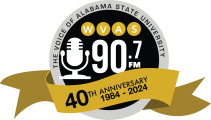-
A new study finds that horse whinnies are made of both a high and a low frequency, generated by different parts of the vocal tract. The two-tone sound may help horses convey more complex information.
-
The semi-aquatic dinosaur, Spinosaurus mirabilis, was discovered by an international team of scientists working in Niger.
-
Drinking water around the District of Columbia hasn't been contaminated. But scientists say the environmental damage could be severe.
-
President Donald Trump said Thursday that he's directing the Pentagon and other government agencies to release files related to extraterrestrials and UFOs because of "tremendous interest."
-
NASA's Jared Isaacman slammed Boeing for failures with its Starliner spacecraft, which was deemed unsafe to return its crew of two astronauts from the International Space Station
-
Archeologists found evidence that ancient Romans may have used a medical treatment involving perfume... and human feces.
-
NPR's science podcast Short Wave talk about how ultrarunning affects the body, the trend of intermittent fasting and how to protect people's mental health when they talk with chatbots.
-
A surprising new study shows that baby chickens react the same way that humans do when tested for something called the "bouba-kiki effect," which has been linked to the emergence of language.
-
Researchers found a tiny bottle from ancient Rome that contained fecal residue and traces of aromatics, offering evidence that poop was used medicinally more than 2,000 years ago.
-
In modern-day Jordan, a 1500-year old mass grave sheds light on the lives of people affected by the Plague of Justinian.
-
A study finds that people who did one specific form of brain training in the 1990s were less likely to be diagnosed with dementia over the next 20 years.
-
Many experts had thought sharks didn't exist in the frigid waters of Antarctica.













